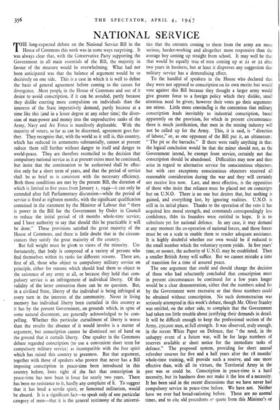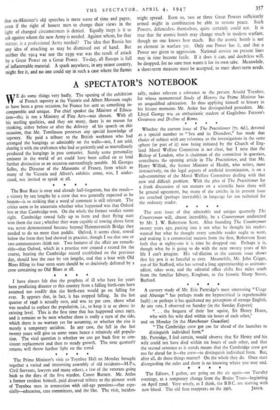NATIONAL SERVICE
THE long-expected debate on the National Service Bill in the House of Commons this week was in some ways surprising. It was always clear that, with the Conservative Party supporting the Government in all main essentials of the Bill, the majority in favour of the measure would be overwhelming. What had not been anticipated was that the balance of argument would be so decisively on one side. This is a case in which it is well to define the basis of general agreement before coming to the causes for divergence. Most people in the House of Commons and out of it desire to-avoid conscription, if it can be avoided, partly because they dislike exerting more compulsion on individuals than the interests of the State imperatively demand, partly because at a time like this (and in a lesser degree at any other time) the diver- sion of man-power and money into the unproductive ranks of the Army, Navy and Air Force is manifestly deplorable. With the majority of voters, so far as can be discerned, agreement goes fur- ther. They recognise that, with the world as it still is, this country, which has reduced its armaments substantially, cannot at present reduce them still further without danger to itself and danger to world-peace. They are therefore reconciled to the decision that compulsory national service as it at present exists must be continued, but insist that the continuation to be authorised shall be effec- tive only for a short term of years, and that the period of service shall be as brief as is consistent with the necessary efficiency. Both those conditions are met by the present Bill, the duration of which is limited to five years from January i, 1949—it can only be extended after full Parliamentary discussion—while the period of service is fixed at eighteen months, with the significant qualification contained in the statement by the Minister of Labour that "there is power in the Bill for the Government by Order in Council to reduce the initial period of 18 months whole-time service; and I have authority to say that should this be practicable it will be done." These provisions satisfied the great majority of the House of Commons, and there is little doubt that in the circum- stances they satisfy the great majority of the country.
But full weight must be givet to views of the minority. Un- fortunately, that body is composed of a variety of persons who find themselves within its ranks for. different reasons. There are, first of all, those who object to compulsory military service on principle, either for reasons which should lead them to object to the existence of any army at all, or because they hold that com- pulsory service is an infringement of individual liberty. Of the validity of the latter contention there can be no question. But, in a civilised State, liberty of the individual is being infringed at every turn in the interests of the community. Never in living memory has individual liberty been curtailed in this country as it has by the present Government,. on grounds which, in spite of some natural discontent, are generally acknowledged to he com- pelling. Whether this particular curtailment of liberty is worse than the results the absence of it would involve is a matter of argument, but conscription cannot be dismissed out of hand on the ground that it curtails liberty. One speaker in the Commons debate regarded conscription (to use a convenient short term for compulsory military service) as incompatible with the free spirit which has raised this country to greatness. But that argument, together with those of speakers who protest that never has a Bill imposing conscription in peace-time been introduced in this country before, loses sight of the fact that conscription in peace-time has now been in force for nearly two years. There has been no resistance to it, hardly any complaint of it. To suggest that it has bred a servile spirit, or fomented militarism, would be absurd. It is a significant facto speak only of one particular category of men—that it is the general testimony of the universi- ties that the entrants, coming to them from the army are more serious, harder-working and altogether more responsive than the average boy coming up straight from school. It may well be that that would be equally true of men coining up at 21 or 22 after two years in business, but at least it disproves any suggestion that military service has a demoralising effect.
To the handful of speakers in the House who declared that they were not opposed to conscription on its own merits but would vote against this Bill because they thought a larger army would give greater force to a foreign policy which they dislike, small attention need be given; however their votes go their arguments are otiose. Little more convincing is the contention that military conscription leads inevitably to industrial conscription, based apparently on the provision, for which in present circumstances there is much justification, that men in the mining industry will not be called up for the Army. This, it is said, is "direction of labour," or, as one opponent of the Bill put it, an ultimatum: "The pit or the barracks." If there were really anything in that, the logical conclusion would be that the miner should not, as the Government intend, be exempt from service, certainly not that conscription should be abandoned. Difficulties may now and then arise in regard to alternative service for conscientious objectors, but with rare exceptions conscientious objectors received all reasonable consideration during the war and they will certainly not receive less now. Last, and most effective, is the opposition of those who insist that reliance must be placed not on conscripts but on U.N.O.. There is no one but desires that, but nothing is gained, and everything lost, by ignoring realities. U.N.O. is still in its initial phase. Thanks to the operation of the veto it has acquired less moral strength, and commands correspondingly less confidence, thAn its founders were entitled to hope. It is no substitute yet for national defence. In any case, it may demand at any moment the co-operation of national forces, and those forces must be on a scale to enable them to render adequate assistance. It is highly doubtful whether our own would be if reduced to the small number which the voluntary system yields. In five years' time, or sooner, the authority of U.N.O. may be established. Then a smaller British Army will suffice. But we cannot mistake a time of transition for a time of assured peace.
The one argument that could and should change the decision of those who had reluctantly concluded that conscription must in present circumstances be continued for a few years longer would be a clear demonstration, either that the numbers asked for by the Government were excessive or that those numbers could be obtained without conscription. No such demonstration was seriously attempted in this week's debate, though Mr. Oliver Stanley was entitled, on the other side, to complain that the Government had taken too little trouble about justifying their demands in detail. It will be difficult enough to keep the professional section of the Army, 250,000 men, -at full strength. It was observed, truly enough, in the recent White Paper on Defence, that "the need, in the unhappy event of a future war, will be for large numbers of reserves available at short notice for the immediate tasks of defence." The proposed system, providing for short annual refresher courses for five and a half years after the IS months' whole-time training, will provide such a reserve, and one more effective than, with all its virtues, the Territorial Army in the past was or could be. Conscription in peace-time is a hard necessity, but its hardness does not make it the less of a necessity. It has been said in the recent discussions that we have never had compulsory service in peace-time before. We have not. Neither have we ever had bread-rationing before. These are no normal times, and to cite old precedents o- quote from this Minister's or that ex-Minister's old speeches is mere waste of time and paper, even if the right of honest men to change their views in the light of changed circumstances is denied. Equally inept is it to ask against whom the new Army is needed. Against whom, for that matter, is a professional Army needed? The idea that Russia has any idea of attacking us may be dismissed out of hand. But neither the 1914 war nor the 1939 war was the result of attack by a Great Power on a Great Power. To-day, all Europe is full of inflammable material. A spark anywhere, in any minor country, might fire it, and no one could say in such a case where the flames might spread. Even so, two or three Great Powers sufficiently armed might in combination be able to restore peace. Such Powers, defenceless themselves, quite certainly could not. It is true that the atomic bomb may change much in modern warfare, though no one knows how much. But the atomic bomb is not an element in warfare yet. Only one Power has it, and that a Power not given to aggression. National service on present lines may in time become futile. If it does it can, and doubtless will, be dropped, for no sane man wants it for its own sake. Meanwhile, a short-term measure must be accepted, to meet short-term needs.



































 Previous page
Previous page